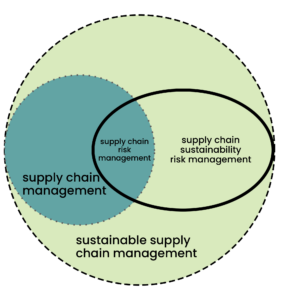Risk on the supply chain from various sustainability-related factors has increasingly become relevant to companies across most industrial sectors. However, supply chain sustainability risk assessment is often disregarded or, more often than not, it often ends up being a conservative rather than innovative tool.
A recent survey conducted by EFFSO found that only 38% of procurement professionals has set quantifiable sustainability targets for their supply chain (EFFSO, 2021). Moreover, according to Sustain Life, only around 30% of the surveyed procurement professionals have assessed their suppliers on ESG measures while 63% declare to limit the assessment to traditional priorities such as distribution capabilities, reliability, and finance (Sustain Life, 2023). In addition to this, more than 50% of the respondents declared that suppliers were unable to provide data regarding their emissions.
If not surprising, these findings are somewhat disquieting, especially considering that for most large companies supply chain emissions (scope 3) largely exceed direct emissions (scope 1 and 2). Despite the increasing regulatory pressure and growing demands from consumers, underwriters, and investors, supply chain sustainability risk is often overlooked.
Studies conducted by public authorities show that a large part of the problem lies in the fact that suppliers, especially small and medium enterprises, don’t have pre-existing due diligence mechanisms in place, lack specific know-how and specialised personnel, and cannot afford to contract large consulting firms to take them through the sustainability transformation process.
Is supply chain sustainability risk assessment a reason for concern?
Not really, no.
First, all legislative bodies are aware of the difficulties arising from “[r]eporting overload and an excessive number of indicators” (UNIRSD, 2022). The load will be fairly – and gradually – distributed among organisations and enterprises of different size and with different structures.
What organisations and enterprises need to do, regardless of their size, is understand the processes underneath supply chain sustainability risk assessment and then take the few necessary steps that will enable to improve sustainability performance along their supply chain.


This doesn’t necessarily or always require large investments or a sudden restructuring of the company’s operations, mostly because supply chain management and sustainable supply chain management overlap significantly and, therefore, so do the respective risk assessment processes.
For example, the severity and likelihood of risks associated to extreme weather events could and should be assessed and managed in both cases.
Similarly, a computer factory in Vietnam using migrant labour from Myanmar (a country that has long suffered from social and political instability, corruption, factional violence, and a humanitarian fallout following the recent military coup) should consider that a severe risk in both frameworks.
In some instances, however, the gap between supply chain risk and sustainable supply chain risk can be much more difficult to bridge. In these cases, investing in proper training for your employees and managers and hiring the services of an ethical consulting firm is advisable.
How we can support you
We are a small team with a good network in the North and in Europe. No emphasis here. We are not a large (and expensive) consulting firm. We are here to support you, the real expert, with your supply chain sustainability risk assessment from a thorough mapping and an effective identification of supplier tiers to the in-depth analysis of risk profiles, ranking your supply chain sustainability risks in line with the relevant indicators, and integrating follow-up procedures to make the process smooth and replicable. The last step will be developing an action plan to consolidate roles and timelines as well as the necessary actions for buyer and suppliers.
Our promise and our goal are to leave your organisation in a better place, hoping you will not need us again. We also hope you will choose to avail you of our expertise and insights again, though, whenever your organisation will face new challenges.
References
Cowger, W., Willis, K. A., Bullock, S., Conlon, K., Emmanuel, J., Erdle, L. M., Eriksen, M., Farrelly, T. A., Hardesty, B. D., Kerge, K., Li, N., Li, Y., Liebman, A., Tangri, N., Thiel, M., Villarrubia-Gómez, P., Walker, T. R., & Wang, M. (2024). Global producer responsibility for plastic pollution. Science Advances. https://doi.org/adj8275
EFFSO (2021), CPO Survey 2021, report. Available at: https://www.effso.se/wp-content/uploads/2022/01/EFFSO-CPO-Survey-2021-summering.pdf
Sustain Life (2023), Supply chain sustainability risks, webinar. Available at: https://www.youtube.com/watch?v=Q5Q6DttONXg&ab_channel=SustainLife
UNRISD (2022), Authentic Sustainability Manual. Online publication.


